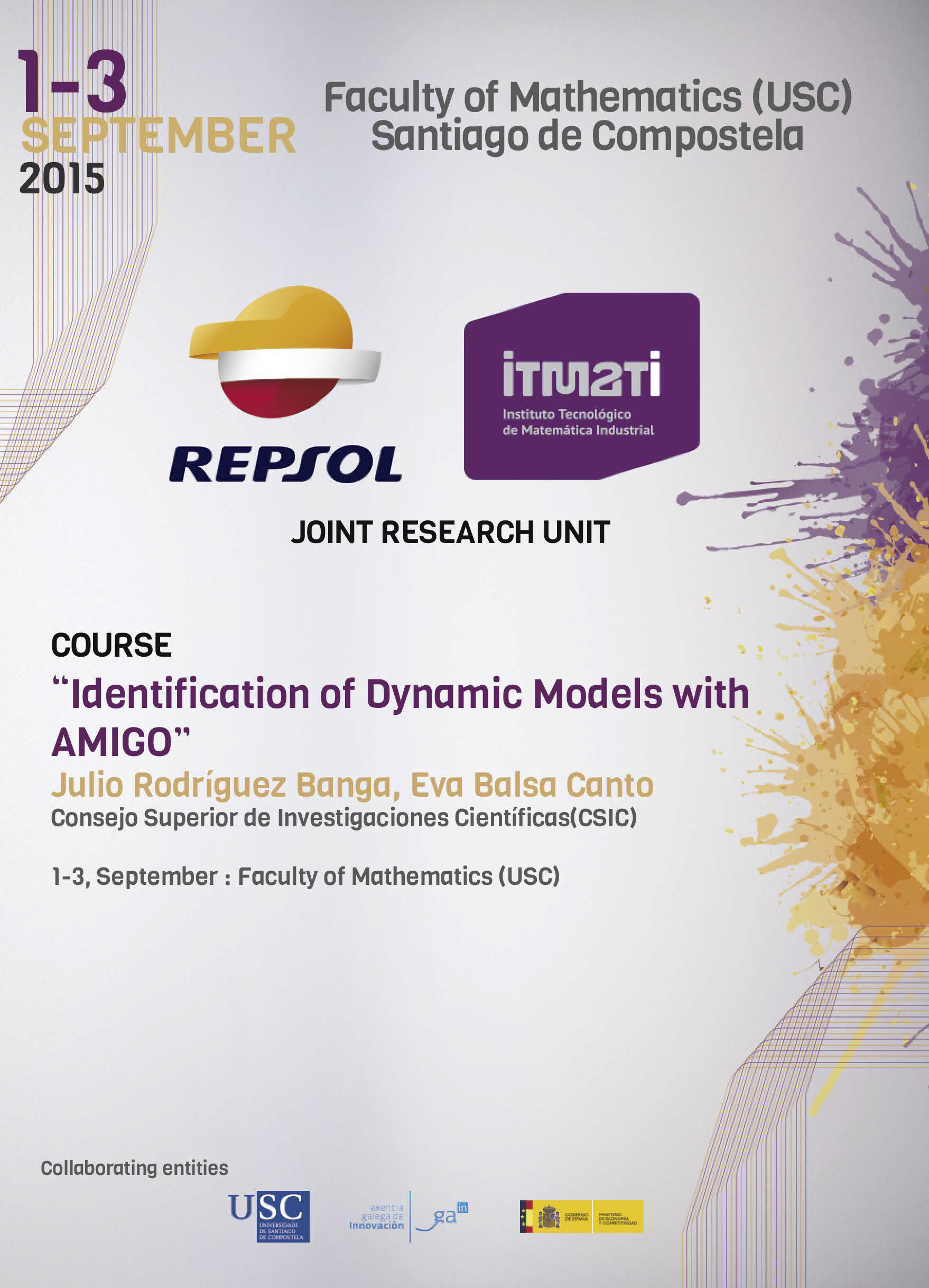Course: Identification of Dynamic Models with AMIGO
From 1st to 3rd of September 2015, It will take place the Course: Identification of dynamic models with AMIGO. The course will take place in the Aula 5 of the Faculty of Mathematics, University of Santiago de Compostela, from 9:00 to 14:00.
- DESCRIPTION: this course considers the identification of dynamic models described by deterministic differential equations. Emphasis will be made on kinetic models describing (bio) chemical reaction networks.
PART 1: An overview of the theoretical fundamentals and the state of the art regarding numerical methods. Concepts will be presented taken into account different perspectives. We will focus on the key issues of non-convexity, uniqueness, identifiability and overfitting.
- Introduction to reverse engineering of dynamic models
- Perspective from inverse problem theory and statistics
- Perspective from system identification and optimization
- Perspective from chemical reaction network theory
- Perspective from machine learning
-
Guidelines for proper indentification of dynamic (kinetic) models
PART 2: The AMIGO toolbox, givint details on the methods implemented and their use.
- Theoretical background: Introduction to parametric model identification: the model identification loop. AMIGO: General overview; Installation; Data structures; Startup.
- Theoretical background: Simulation and sensitivity analysis; Rank of parameters. AMIGO: Input file for simulation; For a given example: Simulation; Sensitivity analysis; Global / local rank of Parameters with an illustrative example
- Theoretical background: Parameter estimation; Cost function definition and methods .AMIGO: Input file for parameter estimation; For a given example: Solve the parameterestimation problem with different cost functions (LSQ, LLK) and different optimizers (local method, multistart and global method).
- Theoretical background: Identifiability abalysis; FIM based methods; Sampling methods. AMIGO: For a given example: Find confidence intervals local approach, sampling approach.
- Theoretical background: Optimal experimental design. AMIGO: Input file. For a given example: Find experimental conditions to improve identifiability compare results with non-optimal experiments.
- Theoretical background: Dynamic optimization. AMIGO: Input file. Solve an example with CVP, different discretization levels, mesh refining.
- ACADEMIC COORDINATOR: José Luis Ferrín González (Associate Professor, Department of Applied Mathematics, USC, and affiliated researcher of ITMATI).
- SCHEDULE:
| Fecha | Clase | Ponente | Horario |
| 01 de septiembre | Clase teórica | Julio Rodríguez Banga, Profesor Investigación, CSIC | 9:00-14:00 |
| 02 de septiembre | Clase teórica y práctica | Eva Balsa Canto, Científico Titular, CSIC | 9:00-14:00 |
| 03 de septiembre | Clase teórica y práctica | Eva Balsa Canto, Científico Titular, CSIC | 9:00-14:00 |
This course will be in live streaming on the Videoconference System of Aula Master and in the following web site http://193.144.34.42/videos/
This course is framed as activity in the Joint Research Unit Repsol-ITMATI which has funding of the Galician Agency for Innovation and the Ministry of Economy and Competitiveness in the framework of the Spanish Strategy Innovation in Galicia.
- REGISTRATIONS: Registration is free. You can confirm your registration in the following registration form (CLICK HERE),before August, 28.
A certificate of attendance for those who request it be delivered.
Fecha:
Tue, 2015-09-01 09:00 - Thu, 2015-09-03 14:00
Place:
Aula 5, Facultad de Matemáticas de la Universidad de Santiago de Compostela
Organizer:
ITMATI, Repsol 








